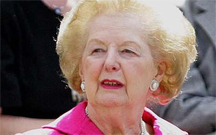LONDON, (Reuters) – No one inflames British passions quite like Margaret Thatcher, the former prime minister whose biopic “The Iron Lady” has rekindled debate on her legacy ahead of the film’s release yesterday.

Legions of admirers cast her as a pioneering politician whose bold policies rescued Britain from economic collapse, but equally numerous detractors see her as a heartless champion of free market orthodoxy at the expense of the poor.
Memories of her 1979-1990 rule have come into sharper focus for many Britons because the country is again grappling with high unemployment, spending cuts, tensions with Europe, union discontent and riots — all features of the Thatcher years.
“Her legacy is enormous,” said Conservative lawmaker John Whittingdale, who was once Thatcher’s political secretary. “She carried through policies that transformed Britain and indeed Britain’s relationship with the world, which will never be reversed and nor would anyone contemplate reversing them.”
He cited Thatcher’s role in ending the Cold War through her alliance with then U.S. President Ronald Reagan, which along with her successful prosecution of the 1982 Falklands war with Argentina, bolstered British authority on the world stage.
Thatcher’s admirers also credit her with turning around, through privatisations and deregulation, what they saw as a quasi-socialist British economy in steep decline and at the mercy of powerful unions when she first took office.
Her detractors point to the bitter and violent strikes when she took on the coalminers’ union in 1984, riots in 1990 over her wildly unpopular Poll Tax, and swathes of industrial Britain abandoned to long-term unemployment and decline.
Her tenure became synonymous with the rise of the “yuppie” and a greedy, individualistic capitalist culture that many blame today for Britain’s economic woes and lack of social cohesion.
“The legacy of Margaret Thatcher was one of division and conflict and the political encouragement of the ‘greed is good’ culture at the root of the banking crisis we are all paying a heavy price for today,” said Bob Crow of the RMT rail union.
In a sign of her continuing ability to stoke controversy, more than 24,000 people have signed a tongue-in-cheek petition pushing for any state funeral for Thatcher to be privatised.
“This unique opportunity is an ideal way to cut government expense and further prove the merits of liberalised economics Baroness Thatcher spearheaded,” the petition reads.
Thatcher is now 86, frail and suffering from dementia.
“FEMINISM IS POISON”
Thatcher’s power to polarise makes it difficult for those trying to give a balanced account of her time in office.
